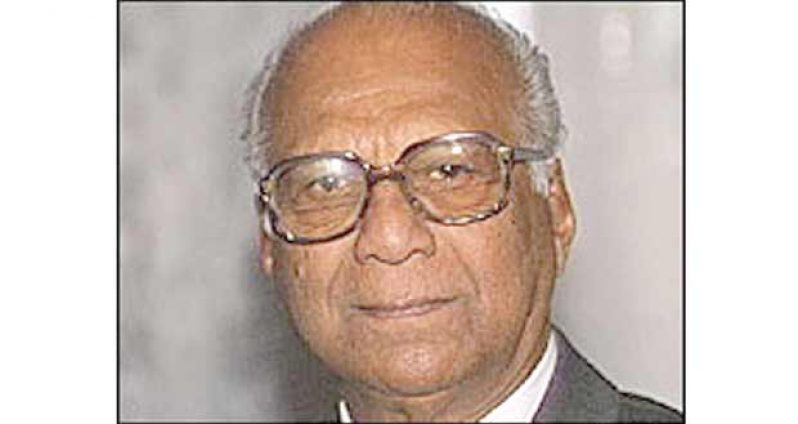THE late Dr. Cheddi Jagan, whose life and works are being celebrated this month, was known for many things: As a radical politician, a revolutionary, a Statesman, a visionary, a prolific writer and a man of ideas.
His ideas and visionary leadership are as relevant today as they were decades ago when he first entered the political stage. I propose, in this article, to focus on Dr. Jagan’s ideas, his vision and his dialectical mind in which he was able to make predictions and draw conclusions based on a scientific intrepretation of the socio-economic and political situation which existed not only in Guyana but at the international situation.
Few men were gifted with that ability to correctly and scientifically define the course of history and politics in Guyana and the world at large, based on an objective analysis of prevailing reality. The following are some of his ideas and thoughts:
Firstly, at an early stage in his political career, he came to the realisation that for development to take place, people at all levels and from all strata of society must be meaningfully involved in the political life of their country. When he came back from his studies in the United States in the early 1940s, he found that the majority of people were not allowed to vote because they were too poor, and because they were illiterate.
In those days, children, especially girls, were taken out of school at an early age to help out at home, so that their parents could work in the cane-fields. Because of that, many of them were unable to read and write, and so they were not allowed to vote.
In those days, only the rich people, people with income or property, were allowed to vote. He realised that without democracy, development could not take place, and he and his Party — the PPP, which he founded in January 1950 — led the struggle for the right to vote for all Guyanese in what is known as Universal Adult Suffrage.
The PPP contested the elections of 1953, which, for the first time, was held under Universal Adult Suffrage. The Party won a landslide victory, winning 18 out of 24 seats. The PPP was removed from office a mere three months later, due mainly to its working-class orientation.
Secondly, Dr. Jagan realised that unless people are free, they cannot participate in the development of their country. So he led the fight for political independence from Great Britain. In those days, the country was ruled by the British Government through the Queen’s representative, the Governor.
Dr. Jagan and the PPP fought for national independence, which was finally won on May 26, 1966. In those days, the entire sugar industry was owned by foreigners, who owned not only the sugar estates but all the major companies. The country was dubbed “Bookers Guyana” because of the stranglehold which Bookers had on the local economy.
Thirdly, Dr. Jagan realised that no country can develop unless there is development of its human resources. So he began to build more schools and training institutions when he won the seat of power, including the University of Guyana, which was his brainchild. The opposition was critical of his idea to set up the University, which they mockingly referred to as, “Jagan Night School”.
Fourthly, he realised that no country can develop and prosper unless there is racial unity. He did his best to involve all the people in nation-building, at one time offering the PNC half of the government in the 1960s, when there was racial tension, engineered by the United States and other reactionary forces to remove the PPP from office.
Fifthly, Dr. Jagan realised that there could be no development when the country is saddled with huge foreign debt. He was a strong advocate for the cancellation of foreign debt, which at one time was eating up nealy 90% of the country’s revenue. Thanks to his strong advocacy, Guyana and many other heavily-indebted countries have had large portions of their debts either cancelled or rescheduled. Today, our debt burden has been significanly reduced to just around five per cent or so of revenues.
Sixthly, Dr. Jagan realised that for development to take place, there must be peace. For him, too much money was spent on wars and on the military, and he showed in his book, “A New Global Human Order”, how a small reduction in military spending could send every child to school, and provide enough for every man, woman and child to eat.
Seventhly, he realised that for development to take place, there must be a fairer system of trade and aid. The rich countries continue to exploit the poor countries by buying our raw materials cheap and selling manufactured goods cheaply. In addition, they are ruining the livelihoods of local farmers by way of subsidies to their farmers.
Eightly, he realised that we must protect and preserve our environment, but in doing so, we must be compensated for preserving our forests. Today, Guyana is a major beneficiary of financial assistance from Norway in its Low- Carbon Development Initiative.
Ninthly, Dr. Jagan realised that we have to mobilise all sections of the society for development. This is why he came up with the idea of the National Democratic State, in which there is a balance between labour and capital, in addition to clean, inclusive and participatory governance.
Tenthly, he called for a new paradigm of development in which there will be prosperity for all, based on a new development model, which is not exploitative, but where the fruits of labour will be equitably distributed. He realised that existing models, based on market principles, are inadequate to provide a good life for everyone. The neo-liberal model of demand and supply must be replaced by a more humane order. It is to the credit of Dr. Jagan that his New Global Human Order, sponsored by Guyana, had been adopted by the United Nations General Assembly.
(By Hydar Ally)



.jpg)









